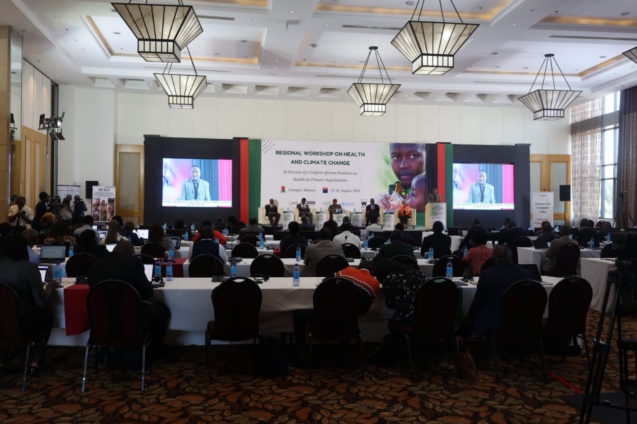
Audio By Carbonatix
"In the global multilateral systems, only 0.5% of the funding is allocated for the health sector. Additionally, less than half of the required needs for water, Sanitation, and Hygiene (WASH) financing are met."
This revelation comes from the Executive Director of the Pan African Climate Justice Alliance (PACJA), who stressed the urgent need for increased financial assistance.
Dr. Mithika Mwenda advocates for augmented funding to bridge these gaps, particularly in the areas of mitigation, adaptation, loss and damage, response measures, and addressing the needs of youth and gender, especially within Africa.
Dr. Mwenda conveyed this message during a regional workshop held in Malawi, where the objective was to establish a unified stance on climate change and its impact on health across Africa.
This event brought together a notable assembly of both state and non-state actors, along with experts and leaders from the health and climate change sectors. The three-day workshop aimed to foster agreement, share insights, and amplify Africa's collective standpoint on health within the context of climate change. The ultimate goal is to nurture sustainable and comprehensive policies that prioritize both health and the environment.
Dr. Githinji Gitahi, CEO of AMREF Health Africa, emphasized the need to fundamentally integrate health into the climate justice dialogue, highlighting that this integration can lead to more comprehensive strategies that protect communities' well-being while simultaneously addressing the global climate crisis.
"By doing so, we can foster more comprehensive strategies that safeguard the well-being of communities while addressing the global climate crisis," he said.
Ephraim Mwepya Shitima, Chairperson of the African Group of Negotiators (AGN), lent his expertise to underscore the importance of cohesive strategies as countries navigate the complex interconnections between climate change and health. He stressed that charting a course that bolsters resilience and sustainable development is essential.
“It is imperative to chart a course that enhances resilience and sustainable development," he said.
Throughout the workshop, participants from diverse sectors engaged in substantive discussions to cultivate a mutual understanding of Africa's unified stance on health and climate change. This collective perspective aims to influence policy decisions, drive advocacy efforts, and guide collaborative actions leading up to COP28.
The World Health Organization (WHO) also emphasizes the significance of integrating health considerations into climate discussions. This approach serves as a unifying force, leveraging health arguments and evidence to effectively reshape the climate narrative.
Latest Stories
-
Ghana is rising again – Mahama declares
4 hours -
Firefighters subdue blaze at Accra’s Tudu, officials warn of busy fire season ahead
5 hours -
New Year’s Luv FM Family Party in the park ends in grand style at Rattray park
5 hours -
Mahama targets digital schools, universal healthcare, and food self-sufficiency in 2026
5 hours -
Ghana’s global image boosted by our world-acclaimed reset agenda – Mahama
5 hours -
Full text: Mahama’s New Year message to the nation
5 hours -
The foundation is laid; now we accelerate and expand in 2026 – Mahama
6 hours -
There is no NPP, CPP nor NDC Ghana, only one Ghana – Mahama
6 hours -
Eduwatch praises education financing gains but warns delays, teacher gaps could derail reforms
6 hours -
Kusaal Wikimedians take local language online in 14-day digital campaign
7 hours -
Stop interfering in each other’s roles – Bole-Bamboi MP appeals to traditional rulers for peace
7 hours -
Playback: President Mahama addresses the nation in New Year message
8 hours -
Industrial and Commercial Workers’ Union call for strong work ethics, economic participation in 2026 new year message
9 hours -
Crossover Joy: Churches in Ghana welcome 2026 with fire and faith
10 hours -
Traffic chaos on Accra–Kumasi Highway leaves hundreds stranded as diversions gridlock
10 hours

